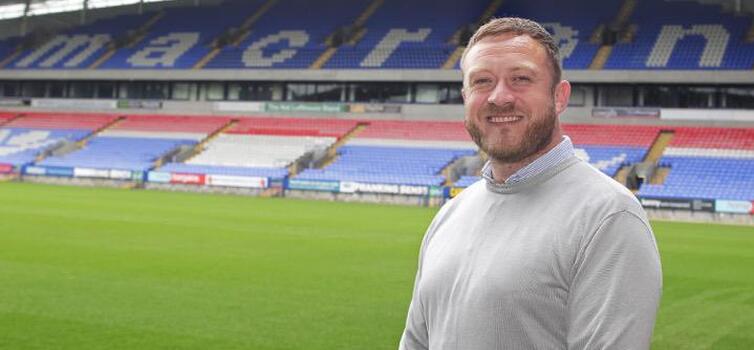Chris Markham: Competing in a ‘League of One’ at Bolton

Chris Markham at the Macron (photo courtesy of Harry McGuire iScoop)
Written by Simon Austin — August 31, 2021
WHEN Chris Markham first held talks about joining Bolton Wanderers, the club hadn’t won in six matches and were 20th in League Two.
In terms of player identification - which was to be a big part of his proposed role - there were “no reports, no online databases, nothing historic we could build on.”
It didn't seem an enticing prospect, but for Markham, who had been Game Insights Lead at the Football Association for the previous four years, it was a great opportunity.
“It was exciting, because I could implement a lot of the things I’d worked on earlier in my career, without any roadblocks,” he tells TGG. “It was a pretty blank canvas. The previous season the club had been relegated, having recently gone into administration.
“They had had to appoint a new manager, a new playing squad, an Academy Manager and the training ground had just been sold. It was starting from nothing, but you can look on that as an opportunity. For a club the size of Bolton, you don’t normally hear of that.”
His initial conversations were with two people who engendered great confidence about the future. The first was chairwoman Sharon Brittan, part of the Football Ventures group that had taken over the liquidation-threatened club in August 2019; the second the manager Ian Evatt, who had arrived from Barrow in July 2020.
“Ian was very certain about his playing philosophy and I thought, ‘You know what, we will be alright here.’ I’d had a look at the team’s recent matches and their performance levels had actually been good, even though they hadn’t been getting the results.
“I asked Ian, ‘Do you see yourself changing the style of play?’ His answer was unequivocally no. Sharon said, ‘Even if he loses the next 10, he’s not going anywhere.’ I thought, ‘This club is a bit different, this is exciting.’”
Markham was appointed Technical Performance Director on February 15th, with responsibility for “establishing an elite and innovative performance culture for the football department.”
His CV was impressive, as he'd been Head of Performance Analysis at Huddersfield Town for four years before joining the FA in 2017. His job title at Bolton was unusual though.
"My role is to employ as much evidence-based decision-making as possible across all areas of football,” he explains.
“Other than medical, I’m responsible for the other areas of performance.”
Markham certainly has a pedigree of evidence-based decision-making, having held an important position behind the scenes during England's recent resurgence at both youth and senior level.
His job at St George's Park involved three main strands - "projects, opposition intelligence and player data profiling."
The most notable of the projects was about penalties.
"It was an 18-month piece of work, in which we reviewed all the literature and collected bespoke data on thousands of penalties, including everything you could imagine - run-up angle, length, steps, strategies of keepers, distraction techniques. It was all-encompassing."
And he seemed to be a lucky charm for Bolton, because his arrival coincided with a dramatic reversal of fortunes. They embarked on an unbeaten run that lasted two months and 14 matches, up until the defeat by Newport County on April 5th; and they climbed up the table, all the way from 20th to third, eventually earning automatic promotion.
However, Markham says credit for the transformation goes to others, not least Evatt and Brittan.
Much of his first six months at the club were spent preparing for the summer transfer window, which ends today - and for the ones after that. This means being able to analyse potential recruits according to the manager's (and club's) philosophy and style of play.
“Phase two” of Markham's remit, which is just beginning, will involve looking at "first-team performance, so how do we give the manager the best information to make decisions, using performance analysis, sport science, data and so on.”
There will also be a focus on “improving the alignment between the first team and Academy, embedding the Bolton philosophy throughout the entire club.”
In February, the Trotters went down to Category Three, having been one of the original Category One teams when EPPP was introduced in 2012.
There are no immediate plans to apply for Category Two again, but “there will be decisions in the near future about how we rebuild the Academy in the medium to long-term, and this will be a big part of my job.”
Markham adds: “There is an opportunity to build something really positive for the future in terms of the Academy. We have entered a team in the Central League, which is a bit like the old-school reserve league.
“We will be able to use the first-team players who aren’t getting many games or who are coming back from injury, as well as the scholars and U18s.”
Having now been with the club for almost seven months, Markham says his initial impressions of an exciting project have actually been enhanced by his experiences with the Trotters.
The club are currently 13th in League One after a solid start and Markham argues there is much more to come.
“We always talk about being in the ‘League of One’, which means doing things your own way and being the best you can be. There can be a culture in football of, ‘If I just do what everyone else has done I’ll be ok, I’ll keep my job and be safe.’
“Sharon is the opposite of that. She doesn’t want to be the same as everyone else, she takes pride in wanting to do things differently. The ownership are committed to putting Bolton back on the map in a sustainable manner and it’s an exciting time.”







-1.png)





